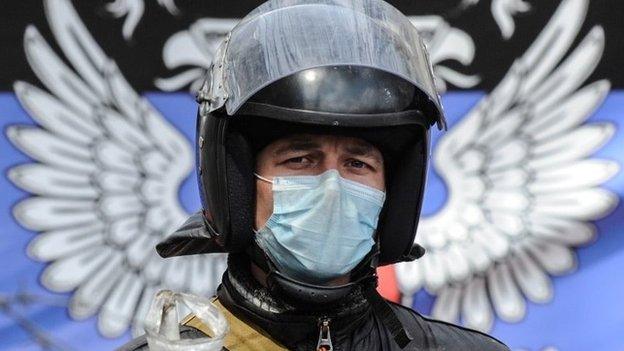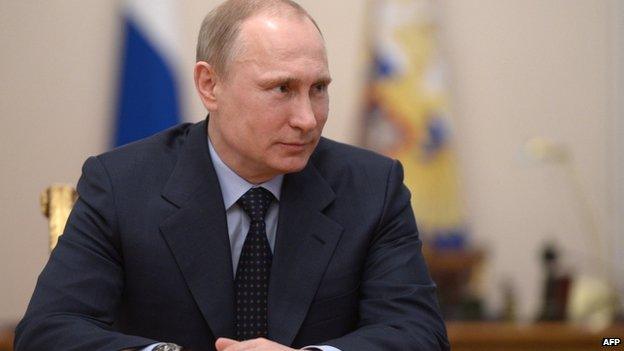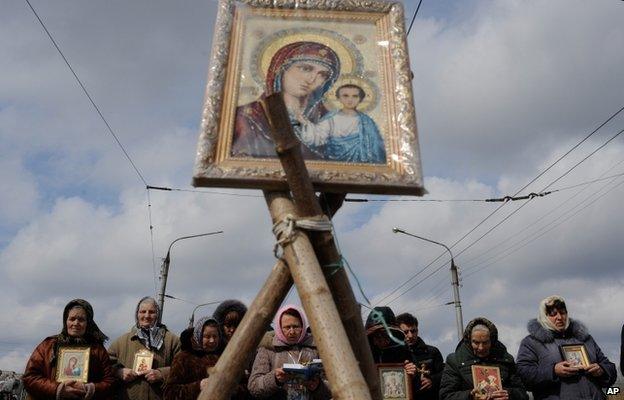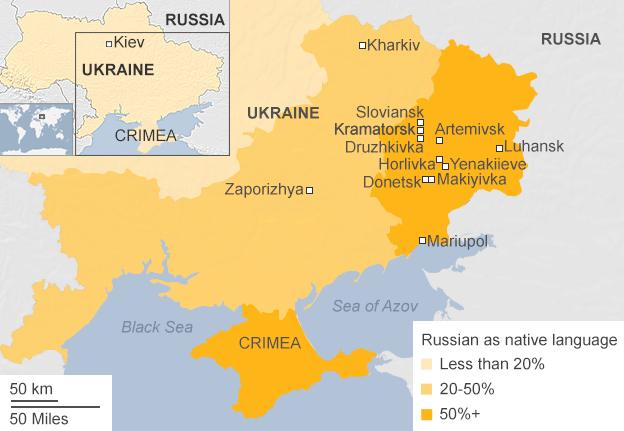Europe moves softly softly on Ukraine
- Published
- comments

An armed pro-Russian activist in front of a seized building in Sloviansk
Since the last European summit - when Europe's leaders warned Russia of further sanctions if there was no de-escalation of the crisis - events have moved fast on the ground.
Pro-Russian militias, most of them armed, have seized buildings in nine eastern and southern Ukrainian towns.
Four town halls have been occupied, as have two police headquarters, two buildings belonging to the Ukrainian Security Service (SBU) and the regional administrative headquarters in Donetsk.
The territorial integrity of Ukraine has already been weakened.
The United States, Nato and most European leaders believe these actions are being supported by Russia with the intention of destabilising Ukraine.
Even the German government, which has been ambivalent about exerting pressure on the Kremlin, has concluded that "there are a lot of signs that armed gangs in eastern Ukraine are getting support from Russia".
That was the background to the meeting of Europe's foreign ministers.
In the event they agreed to add to the list of 18 Russian and Crimean officials who are subject to travel restrictions and an asset freeze.
A sign of the caution of Europe's ministers is that we do not yet know how many more Russian officials will be subject to these sanctions. That will be worked on on Tuesday.
As regards deeper economic sanctions, Europe is still "completing the work" on what are called Phase Three sanctions.
In Luxembourg, at the final press conference, these economic sanctions were not even mentioned.
For further EU sanctions to be imposed there has to be unanimity.
'More, not less diplomacy'
That will prove difficult to achieve.
It is just possible that if the meeting in Geneva on Thursday - involving the US, Russia, the EU and Ukraine - is unsuccessful then the EU will hold an emergency summit next week to discuss moving to Phase Three and economic sanctions, but there are significant differences between the EU's 28 nation states.
There are those who believe Russia will only listen to a resolute and determined EU.

Europe's hesitancy is clear for Russian President Vladimir Putin to see

Women praying for peace in the eastern Ukrainian town of Sloviansk
The UK Foreign Secretary, William Hague, said "further sanctions have to be the response to Russia's behaviour".
The Swedish Foreign Minister Carl Bildt said "if they [the Russians] escalate, then I think we should escalate"; President Francois Hollande told President Barack Obama that France favoured "firm but graduated sanctions".
But the Dutch Foreign Minister, Frans Timmermans, said it was "too early to impose more sanctions".
The German Vice-Chancellor, Sigmar Gabriel, speaking in Berlin, called for "more, not less diplomacy" from Europe and suggested that "sabre-rattling by Nato" would not solve the problem.
Spain and Italy are both very cautious about strengthening sanctions.
What remains unclear is what would trigger Europe moving to Phase Three and economic sanctions.
Its hesitancy is clear for Moscow to see.
Some are suggesting that Thursday is a last chance for Russia to de-escalate the crisis and to pull back the 40,000 troops it has on the Ukrainian border.
But there are now new facts on the ground: towns effectively occupied by pro-Russian militias who are determined to hold referendums on whether to separate and join Russia.
For Europe it is a defining moment: whether they can find the unity and resolve to stand against borders being re-drawn by force.

The map shows towns where pro-Russian activists have seized buildings